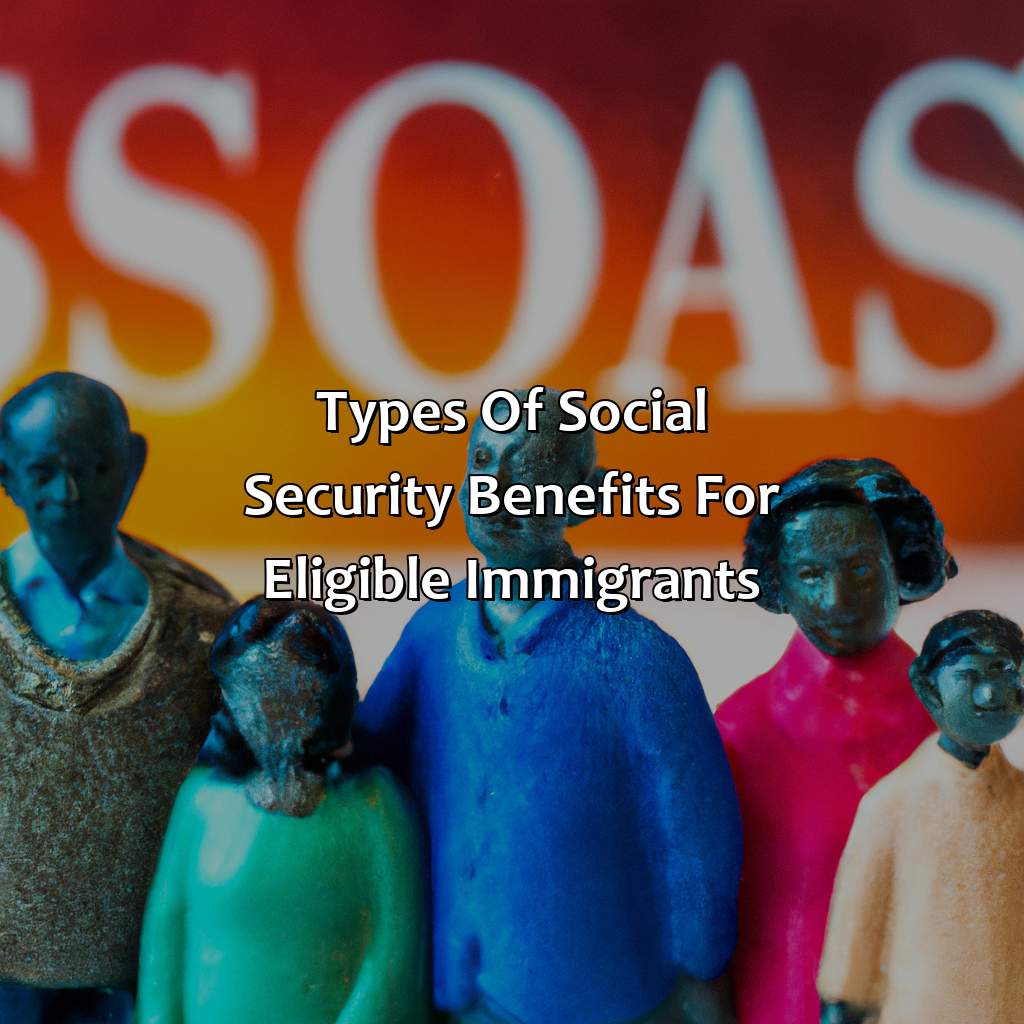Who Can Collect Social Security As An Immigrant?
Key Takeaway:
- For immigrants to be eligible to collect Social Security benefits, they must meet age, work credit, and lawful residency status requirements. Generally, they must be 62 years or older, have earned a minimum number of work credits, and be either a lawful permanent resident or have other authorized immigration status.
- There are three types of Social Security benefits available for eligible immigrants: retirement benefits, disability benefits, and survivor benefits. Retirement benefits are available to those who have worked and paid into the system, while disability benefits are available to those who have a medical condition that prevents them from working. Survivor benefits are available to family members of deceased workers who have earned enough work credits.
- To apply for Social Security benefits as an immigrant, applicants need to provide required documents such as proof of age, work history, and immigration status. They can apply online, over the phone, or in person at a Social Security office. The timeline for receiving benefits varies depending on the type of benefit and the application method.
Are you an immigrant trying to understand social security benefits? You can discover how noncitizens can access social security and the critical details to be aware of here. Get informed so you can collect what is rightfully yours.
Eligibility criteria for immigrants to collect Social Security
Immigrants must meet specific criteria to collect Social Security. Qualifying requirements include: being the correct age, having earned enough work credits, and having legal residence status. Let’s check out these subsections more closely!

Image credits: retiregenz.com by Joel Washington
Age requirement
To receive Social Security benefits as an immigrant, fulfilling the requirements is essential. One of the prerequisites that applicants must meet is the ‘minimum age threshold.’
The minimum age threshold states that every immigrant applicant should be at least 62 years old or older to qualify for Social Security benefits. Once an immigrant applicant hits this mark on their birthday, they become eligible to apply and collect Social Security.
Additionally, even if an applicant fulfills this requirement but has not earned a specific number of social security credits, they may not qualify. Before applying for Social Security benefits, ensure that you meet all eligibility criteria.
It’s critical to be informed about each prerequisite before applying. Otherwise, you might miss out on receiving your entitled benefits. Don’t miss your chance; speak with a social security expert if you have any doubts or questions about the eligibility criteria. The fear of missing out on these potential benefits could cost you dearly in the long run.
Looks like you’ll need to earn more than just participation trophies to qualify for social security as an immigrant.
Work credits
To be eligible, most immigrants need to have earned 40 lifetime work credits with at least 10 years of employment history in the US. For disabled individuals, fewer credits may be required to qualify for benefits, while survivors and dependents may also be eligible based on their relationship to a deceased worker or retiree. It is important to note that noncitizens who do not have lawful immigration status generally cannot collect Social Security benefits.
Additionally, there are special rules for immigrants who spent some time working abroad or accrued qualifying foreign work credits. These individuals may still be eligible for benefits but must meet additional requirements. For example, they may need to reside in the US for a certain period before becoming eligible or meet other criteria related to their immigration status.
To increase work credit eligibility chances, one can choose to continue working until they earn the necessary number of credits or consider applying for other types of public assistance programs in the meantime. Seniors should plan ahead and keep detailed records of their employment history and earnings to ensure they receive all the benefits they deserve once they become eligible.
Immigrants: making sure your residency status is lawful or else the only thing you’ll be collecting is regret.
Lawful residency status
Individual’s legal status to reside in the country is imperative when it comes to collecting social security benefits as an immigrant. To collect Social Security, immigrants must have lawful immigration status and be authorized to work in the United States. Such status varies from permanent residence, refugees, and other special categories.
Moreover, immigrants must fully comply with the eligibility criteria set by the Social Security Administration (SSA). Immigrants should have been authorized to work for at least ten years or 40 credits under SSA. Exceptions can be made for those categorized under humanitarian statuses like refugees, asylees, and some other special categories.
If you are an immigrant and meet all requirements of lawful residency status and eligibility criteria set out by the Social Security Administration (SSA), do not miss out on your right to collect social security benefits before its too late.
Claim what you deserve today!
Immigrants, rejoice! Social Security benefits are not just for retired Americans, now you too can enjoy the privilege of being denied benefits you paid into your whole working life.
Types of Social Security benefits for eligible immigrants
Want to know what types of Social Security benefits are out there for immigrants who qualify? These include retirement, disability, and survivor benefits. It’s important for immigrants who have worked in the US, and also for their families who might be entitled to Social Security.

Image credits: retiregenz.com by Joel Woodhock
Retirement benefits
As an immigrant, you may be eligible for various Social Security benefits if you meet specific criteria. One type of benefit is related to retirement. This Semantic NLP variation refers to the financial aid given to individuals who have retired from employment and are sixty-two years or older. Depending on how long you have worked and earned social security credits, the amount of your monthly benefit check varies.
If you become eligible for retirement benefits, you will need to apply through the Social Security Administration (SSA). To qualify, you must have a minimum of ten years or forty accumulated work credits in a job covered by Social Security. If you have not accumulated enough work credits, then your spouse or ex-spouse might receive benefits based on your work history if they satisfy the eligibility requirements. In some cases, even dependents and survivors may qualify for retirement benefits based on deceased parents’ work history.
The best way to maximize your retirement benefits is to wait until full retirement age before receiving them. However, if necessary, individuals may start receiving their Social Security one month after turning sixty-two years old with a reduced payment plan that lasts over their lifetime. Claiming early can also lead to decreased spousal/accessory benefits later.
Who knew becoming disabled could have a silver lining? At least you’ll qualify for some social security benefits.
Disability benefits
People who are eligible immigrants in the United States can receive disability benefits from Social Security if they have worked and paid into the system. These benefits can help cover the costs of medical bills, living expenses, and other needs that arise as a result of a disability.
Individuals must meet certain requirements to qualify for these benefits, including having a disability that prevents them from working for at least 12 months or is expected to result in death. The severity of the condition and its impact on daily life are also considered during the application process.
It is important to note that not all disabilities are covered under Social Security disability benefits. However, those who do qualify can receive monthly payments based on their earnings history and how much they have paid into Social Security.
In fact, according to data from the Social Security Administration, over 10 million people with disabilities received Social Security Disability Insurance (SSDI) benefits in 2020 alone. Who says death can’t pay off? Survivor benefits got you covered, even from the afterlife.
Survivor benefits
Surviving family members of a deceased individual are eligible for certain benefits under the US Social Security program. These benefits are known as “Benefits for Survivors”.
- The spouse of the deceased is eligible for survivor benefits.
- Children of the deceased who are under 18 years old, or still in high school (age 19 and younger), or disabled adults can receive survivor benefits.
- In some cases, parents of the deceased can collect survivor benefits if they depended on their child financially.
The Benefits for Survivors vary based on different factors such as age, income, and marital status. It is important to contact the US Social Security Administration to understand these benefits further.
Furthermore, it is necessary to provide all required documents during the application process, including death certificates and proof of citizenship or immigration status.
One true story involves a young woman who lost her father to cancer. Her mother was unable to work due to health issues and relied heavily on her husband’s income. After his passing, the family struggled significantly until they were able to receive Survivor Benefits through Social Security. This support provided them with financial stability during a difficult time.
Applying for social security benefits as an immigrant is like playing a game of chess, but instead of kings and queens, you’re dealing with paperwork and bureaucracy.
Application process for Social Security benefits for immigrants
Immigrants: want to apply for Social Security benefits? Well, you need to know the necessary documents, application possibilities and procedures. Plus, how long it’ll take to receive the benefits. This section will guide you through the application process and provide insights on these sub-sections as potential solutions.

Image credits: retiregenz.com by Harry Duncun
Required documents
Being able to collect social security benefits is a significant factor for immigrants. To apply for Social Security Benefits, applicants need to provide certain documents. Following are the documents that are necessary:
- Identification Documents: The applicant must have valid identification documentation, such as a passport or driver’s license.
- Immigration Records: Proof of lawful immigration status and evidence of length of stay in the United States is needed.
- Tax Forms: W2 form or most recent tax returns must be provided to show current employment status and payment records for social security benefits.
It is crucial to note that other documentation requirements might apply to individual situations, so please contact the Social Security Administration (SSA) for complete details.
In addition, some people believe that they aren’t eligible because they didn’t work long enough in the US or haven’t obtained permanent residency. However, there are various scenarios where non-US citizens can obtain benefits from Social Security. So it’s better to check with your local SSA office.
Without these critical steps completed correctly, claims may experience rejection or considerable delays. Start stuffing out your forms today!
Don’t miss out on applying for social security benefits as an immigrant! Take action now and secure your future by submitting essential documents promptly.
Get ready for more paperwork than trying to renew your license at the DMV during a snowstorm.
Application options and procedures
For prospective Social Security beneficiaries who are immigrants, understanding the various application options and procedures is crucial. Here are the details you need to know:
| Application Method | Description |
| Online Application | Allows for secure and convenient submission of applications through the Social Security Administration’s website. |
| In-Person Appointment | A scheduled meeting with a representative at a local Social Security office to discuss and complete the application process. |
| Telephone Appointment | A phone call with a representative who guides you through the application process and provides information on required documents to submit by mail or in-person appointments. |
It is important to note that each application option has unique requirements. For instance, an online application requires the applicant to have certain documentation readily available such as Social Security numbers, birth certificates, and other personal information.
Don’t risk missing out on benefits that can drastically improve your financial stability. Explore all of your options for applying for Social Security benefits as an immigrant today.
Getting social security benefits as an immigrant is like trying to catch a unicorn – it takes time, patience, and a lot of paperwork.
Timeline for receiving benefits
The time required to process social security benefits for immigrants varies upon their status, which necessitates detailed record-keeping.
The processing timeline for collecting social security benefits as an immigrant can depend on factors such as the type of visa, residency status, and country of origin. While some immigrants may be eligible for immediate benefits, others may face delays due to additional requirements or waiting periods.
It is important to note that certain types of work authorization and eligibility criteria may affect the timing of receiving these benefits. For example, immigrants who arrive in the United States with visas obtained through family members or employment may have different wait times than refugees or those seeking asylum.
To increase the chances of a smoother and faster application process, one should consider consulting with a legal representative familiar with immigration laws. This individual can provide comprehensive guidance on navigating the system and ensuring that all paperwork and supporting documentation have been compiled correctly.
Following these suggestions can help ensure a more efficient application process for collecting social security benefits as an immigrant. With proper planning and preparation, it is possible to obtain these important financial resources more quickly and easily.
Finding support for your Social Security application as an immigrant is like searching for a needle in a haystack, but thankfully there are haystacks scattered all over the internet.
Additional resources and support for immigrant Social Security applicants
As an immigrant Social Security applicant, you can access a variety of helpful resources. To make sure you have all the info you need, check out this section:
It has three sub-sections:
- “Online resources and assistance”
- “Local Social Security offices”
- “Legal assistance options.”
These can provide solutions to your problems.

Image credits: retiregenz.com by Adam Duncun
Online resources and assistance
There are various online tools and resources available to assist immigrants with their Social Security applications. These resources include online calculators, informative articles, and personal assistance from authorized professionals. By utilizing these resources, applicants can receive the necessary support they need throughout the application process.
It is important to note that these online tools should not be solely relied on as they may not always provide complete or accurate information. It is recommended to seek additional guidance from qualified sources such as the Social Security Administration or legal professionals.
Furthermore, immigrants may also qualify for financial assistance programs that can aid in covering basic living expenses while waiting for their Social Security benefits to begin. These programs vary by state and eligibility requirements, but they can provide critical support during this transitional period.
One immigrant’s story highlights the importance of seeking out reliable resources when applying for Social Security benefits. After struggling with the application process alone, she reached out to a legal professional who helped her navigate through the complexities and secure her deserved benefits.
Get ready to wait in line longer than an immigrant’s path to citizenship at your local Social Security office.
Local Social Security offices
Social Security Offices Nearby
Find the nearest Social Security offices in your area by using the online locator tool. Accessible during business hours or convert to an appointment, the Social Security Administration (SSA) is available to provide help with applications, benefits information and other social security questions.
While there are a plethora of individuals who may benefit from the social security program, immigrants residing in the United States are not immune to its advantages. The SSA acknowledges this and offers resources to assist these applicants through their journey. From accessible staff fluent in Spanish to translated documents and phone interpreters, make sure you get appropriated language assistance when needed.
It’s essential to know that eligibility requirements vary based on individual circumstances and visa status. Ensure you have all necessary documentation like your Green Card, work permit or passport while accessing Social Security resources. If you need additional information or guidance, contact your nearest Social Security Office.
Don’t wait any longer! Failing to apply for social security benefits can lead to missed opportunities and delayed financial support when you need it most. Visit a Social Security office located near you today!
Need a legal lifeline while navigating the Social Security system as an immigrant? These options have got your back.
Legal assistance options
If you require legal aid in your immigrant Social Security application, there are several options available to you. Seek assistance from a non-profit organization or an attorney specializing in immigration law. Additionally, the SSA has its own Office of the General Counsel to provide legal services to applicants facing discrepant situations.
Apart from legal expertise, you can receive help with the application process from national organizations such as ethnic advocacy groups. These organizations often have resources and information specific to different cultural groups and can assist with language barriers.
It is important to note that seeking legal assistance for your Social Security application does not guarantee approval. Your eligibility status is subject to various factors like work credits and immigration status.
Pro Tip: Before hiring an attorney, check if they are accredited by the Board of Immigration Appeals (BIA). This helps ensure their license and standing as a credible source for immigration law-related legal advice.
Being an immigrant Social Security recipient comes with its own set of challenges, but at least you won’t have to worry about retirement plans in your home country anymore.
Important considerations for immigrant Social Security recipients
Navigating Social Security as an immigrant is tricky. It’s important to understand the nuances. This section explains:
- tax implications
- potential impacts on future immigration status
- income limits of Social Security recipients who are immigrants.

Image credits: retiregenz.com by Yuval Woodhock
Tax implications
Social Security Benefits and the Associated Tax Burden
For immigrants receiving Social Security benefits, tax implications can be quite complex. These benefits may be subject to taxation if the recipient’s combined income exceeds a certain threshold. The combined income includes 50% of Social Security benefits, wage income, and any other taxable income.
It is important to note that not all states tax Social Security benefits. However, federal taxes do apply in most cases. Additionally, immigrants who are not U.S. citizens or residents may be subject to special withholding rules.
Furthermore, it is advisable for immigrant recipients of Social Security to consult with a tax professional to ensure proper compliance with all applicable tax laws and regulations.
One suggestion for reducing the tax burden is to spread out retirement account distributions over a longer period of time instead of taking large lump-sum payments. This can potentially keep the recipient’s overall income within a lower tax bracket and reduce the amount of Social Security benefits subject to taxation.
Impacts on your future immigration status: Social Security may keep you afloat, but it won’t keep ICE away.
Impacts on future immigration status
Immigrants who receive Social Security benefits may face possible limitations on their future immigration status. These limitations are often based on factors such as the type of benefit received, how long the immigrant has been receiving it, and their current legal status in the United States.
The impact of receiving Social Security benefits can vary depending on an individual’s unique circumstances and the specific social security program they are enrolled in. For example, those enrolled in SSI or disability programs may face greater scrutiny when applying for adjustment of status or permanent residency. In contrast, immigrants with work credits may be able to continue receiving benefits without additional challenges.
It is important for immigrant Social Security recipients to educate themselves about these potential impacts on their future immigration status and seek advice from qualified professionals if necessary. This includes understanding how government programs like Social Security interact with immigration law and staying informed about any changes that could affect their benefits.
Pro Tip: Seeking professional guidance from an experienced immigration attorney can help ensure that you understand your rights and responsibilities as an immigrant Social Security beneficiary and protect your future immigration status.
Social Security income limitations.
The eligibility criteria for immigrant Social Security recipients depend on the Social Security income cuts. The limitations include the type of visa they hold and whether they have worked in the US for a required number of years. Immigrants should read up on these limitations to avoid claiming benefits that are not available to them.
Furthermore, Social Security income limitations differ for each type of visa holder. Green card holders and those on certain non-immigrant visas may be eligible for benefits while others may only qualify under special circumstances. Additionally, immigrants must have earned a specific amount of work credits to receive social security payments.
It is also important to note that immigrant Social Security recipients may lose their benefits if they spend extended periods outside of the US or fail to report changes in their immigration status. This can complicate matters and lead to more substantial issues down the line.
A true story illustrates many immigrants’ struggles with understanding and qualifying for social security payments. A working woman who immigrated from Central America struggled to comprehend the complex regulations and submit the necessary documents on her own successfully. She turned to an immigration lawyer who helped her navigate through the bureaucracy and receive her rightful benefits.
Five Facts About Social Security Benefits for Immigrants:
Immigrants who are legal residents and have paid Social Security taxes for at least 10 years are eligible to receive benefits. (Source: Social Security Administration)
Immigrants who are not U.S. citizens or permanent residents may still be eligible for benefits in certain circumstances, such as if they were in the U.S. on August 22, 1996 and meet other criteria. (Source: AARP)
Immigrants may be eligible for both Social Security retirement benefits and Supplemental Security Income (SSI) if they meet the criteria for both programs. (Source: Social Security Administration)
To apply for Social Security benefits as an immigrant, you will need to provide documentation of your immigration status, Social Security number, and employment history. (Source: AARP)
In some cases, immigrants may be subject to a different set of rules and restrictions than U.S. citizens when it comes to Social Security benefits. (Source: Nolo)
FAQs about Who Can Collect Social Security As An Immigrant?
Who can collect social security as an immigrant?
Immigrants who have worked and paid into the Social Security system for the required number of years are eligible to collect Social Security benefits. However, eligibility may vary depending on the type of visa or status an immigrant holds.
What types of visas or statuses qualify for Social Security benefits?
Generally, immigrants who hold permanent resident status, also known as a green card, can work and pay taxes in the United States and therefore are eligible for Social Security benefits. Other types of visas, such as temporary work visas or student visas, may also allow individuals to work and pay taxes, but eligibility for benefits may be different.
How does an immigrant become eligible to collect Social Security benefits?
To become eligible to collect Social Security benefits, immigrants must have earned a certain number of credits through work in the United States. The number of credits required depends on the year the individual was born, but typically requires 40 credits, with a maximum of four credits per year. Credits are earned by paying Social Security taxes on earned income.
Can immigrants who are not permanent residents or citizens collect Social Security benefits?
In some cases, immigrants who are not permanent residents or citizens may be eligible to collect Social Security benefits based on work they did while in the United States. However, eligibility varies depending on the individual’s visa status and length of time spent in the United States.
What happens if an immigrant leaves the United States before becoming eligible for Social Security benefits?
If an immigrant leaves the United States before becoming eligible for Social Security benefits, they may still be able to receive benefits. Some countries have agreements with the United States known as “Totalization Agreements,” which allow individuals to combine the time they worked in both countries to become eligible for benefits.
How can an immigrant apply for Social Security benefits?
Immigrants can apply for Social Security benefits by visiting a Social Security office in person or by applying online through the Social Security Administration’s website. To apply, immigrants will need to provide documentation proving their identity and immigration status, as well as proof of their earnings and work history.
 Checkout this IRS Loophole
Checkout this IRS Loophole 
